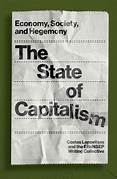
Book Review by Mathew D. Rose
Upon finishing The State of Capitalism: Economy, Society, and Hegemony by SOAS economics professor Costas Lapavitsas and the other ten members of the EReNSEP Writing Collective my question was: why aren’t more books like this being written? If you are not an economist like me, but do a lot of reading concerning political economy, there are inevitably gaps in the information one acquires. This often results in being unable to connect the dots enabling one to recognise the big picture. Lapavitsas and his colleagues provide just such a complete analysis concerning world wide financialisation and the role of the core states and US hegemony, concentrating on the period following the Great Financial Crisis to today, yet without ignoring the historical origins of these developments.
I must admit that I have a predilection for Marxist economists for books like this that cover such a broad topic as they possess a focus and discipline necessary to carry off such a substantial analysis. State of Capitalism is however not dogmatic, incorporating other heterodox perspectives. Costas Lapavistas is a perspicuous analyst and writer, which allows him to execute a project like this with what appears great ease. With the contributions of the other EReNSEP members, the book exhibits a great deal of in depth knowledge in various topics.
The book is divided into three parts. The first, “Unforeseen Health Emergency”, which analyses the shambolic responses of core nation governments to the Covid pandemic, the result of neo-liberal public health policies. This includes the resulting authoritarian regime of the same governments during the pandemic and the transformation of the disaster into an economic boom for the previously much decried Big Pharma. As we learn later on in the book, the ensuing financial crisis would be an equal boon to the financial industry in core nations. This section only makes up round 20 pages of this 360 page work. It is not clear why this was given such a prominence, although the pandemic keeps reappearing throughout the book as a sort of metaphor for the disastrous political, economic, and environmental development of Western capitalism.
The second part is entitled “The State and Domestic Accumulation at the Core” that is dedicated to the development of financialisation in core nations in the past forty years. Shifting from bank-based to market-based finance. Its extensive assessment begins by examining the causes of the Great Financial Crisis 2007-2009 and follows the path of the evolution of domestic accumulation and speculative capital in core economies in its aftermath, the “Interregnum”. During the Great Financial Crisis we witnessed how core nation central banks became “security dealers of last resort” thanks to their fiat money monopoly. That had been primarily a private bank crisis and these had been purportedly reined in to prevent a repetition of such an event by limiting their speculation on their own account. In their place in the decade following that crisis shadow finance grew astronomically. These were even more vulnerable to financial turbulences as the world was to discover when Covid broke out and later the war in Ukraine. In the US these were not only being negligibly controlled by the Fed, but their development expedited. When the pandemic financial crisis struck it was the Fed that came to the rescue of shadow banking and the corporations they had heavily invested in. This meant, as was the case in the Great Financial Crisis, a massive expansion of the public debt (being currently used as an argument to reintroduce austerity), this time much greater. The authors follow and analyse these developments including aspects of the pandemic crisis such as the rapid inflation beginning in 2020.
“States and Capitals in the World Economy” is the third and final part of the book. This focusses mainly on the political and economic relationship between the core and peripheral nations, especially the hegemonic role of the United States and raises the question of in how far this is being threatened by peripheral nations, especially China. The book was apparently written before the recrudescence and expansion of the BRICS, but it fits in perfectly with the analysis of the authors.
Imperialism has transcended from military intervention to financial intervention. Where earlier global hegemons, such as Britain, relied on its navy to enforce its predominance, today’s sole hegemon, the USA, does this through its dominant currency, although it has the world’s predominant military might if needed. This has been re-enforced by the international multilateral coalitions and institutions that it has created to support its international dominance such as the IMF, World Bank, World Trade Organisation, and NATO. All of these enabled the expansion of globalisation, which unleashed its international financial dominance, assisted by its ability to dictate “the legal, institutional, financial, and monetary framework of the world economy with the aim of facilitating profit making, always within a hierarchy of core and peripheral nations”. The organic development of US hegemony is extensively analysed in this section
This US hegemony is currently being challenged, much of which has been due to the US’s own doing. Not only did it permit and support the economic rise of China, which has become a serious geopolitical and economic competitor, but also its arbitrary freezing of the Russian central bank’s dollar reserve has diminished the credibility of the US dollar as world money.
The authors dedicate sections of this part of the book to “The Chinese Hegemonic Challenge”, “The Sickness of Europe”, and “The Greening of Capitalism”, the latter of which deals with the inherent environmental destructiveness of capitalism and the attempt of these same actors to cash in on battling the climate crisis they themselves created and continue to perpetrate.
The book ends with a call for leftists to develop a political programme as an alternative to private capital enabling a strong intervention to restore not only social and economic justice, but also democracy.
If you wish to conclude your year consolidating your understanding of the world economy and its geopolitical elements, this book certainly offers the opportunity to do so. It is well written and easily accessible to the non-economist.
The State of Capitalism: Economy, Society, and Hegemony by Costas Lapavitsas and the EReNSEP Writing Collective
Publisher: Verso
ISBN : 978-1839767845




1 Trackback / Pingback